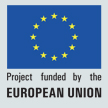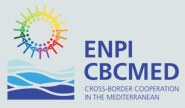SWMED project Workshop “Management of Olive Mill Wastewater in
Palestine : Strategies and Sustainable Solutions”
Extremely high organic loaded aqueous waste are generated from the olive oil extraction process,
so called olive mill wastewater (OMWW). In Palestine OMWW is disposed directly to sewer
system or valleys, whereas the solid waste (olive husk) is dumped into lands nearby the oil
extraction factories without pretreatment. This increases the risk of contaminating soil, surface
water resources, and groundwater aquifers, mainly due to poor biodegradability and toxicity of
polyphenols present in OMWW. In addition, the existed and future wastewater treatment plants in
West Bank are designed on a basis that does not take into account sudden overloading, and shocks
related to OMWW discharges.
In this workshop, the environmental state of art of olive mills in Palestine and their negative
environmental impacts were presented and discussed. Different pre-treatment options, tested by
Palestinian researchers working in the field of OMWW management in Palestine, were also
presented. The workshop also highlighted the role of different governmonetal and nongovernmental bodies to achieve the best management practices of olive mills wastes in Palestine.
The workshop came out with several conclusions including that; OMWW introduces extremely
high pollution load if discharged directly to environment. OMWW pre-treatment is essential to
meet the Palestinian guidelines for wastewater discharge.
The feasibility and sustainability of OMWW treatment processes are of big concern with reference
to the scattered distribution and location of olive mills near residential areas, taking into
consideration the seasonal generation of OMWW .The large amount of phenolic compounds in
OMWW deaccelartes and hinders biological treatment processes in natural systems and in WWTPs,
detracting their economic viability. Therefore, removal of polyphenol from OMWW would be an
attractive option which will improve and protect conventioanl biological treatment processes. An
innovative treatment option was presented by a Palestinian researcher from An-Najah National
University which include preparation of activated carbon from olive mill solid waste; to be used as
an efficient adsorbent for removal of polyphenols from OMWW. After phenol detoxification
process, traditional wastewater treatment processes will be able to reduce OMWW pollution load to
legally accepted levels for disposal. The removal of polyphenols from OMWW onto fixed bed
adsorption column packed with activated Palestinian olive stones was investigated in lab scale unit and will be tested in pilot scale level after optimizng the unit design. Integration of fixed bed
adsorption with anaerobic biological treatment will be also tested. Fixed bed adsorption of total
phenol using activated olive stones as packing material will prove to be a low cost, environmental
friendly and sustainable pre-treatment option for OMWW in West Bank. The speakers and
participants also called for cooperative management between concerned sectors to reduce the
environmental impact of OMWW in Palestine.
Palestine Workshop III
Partners Area


